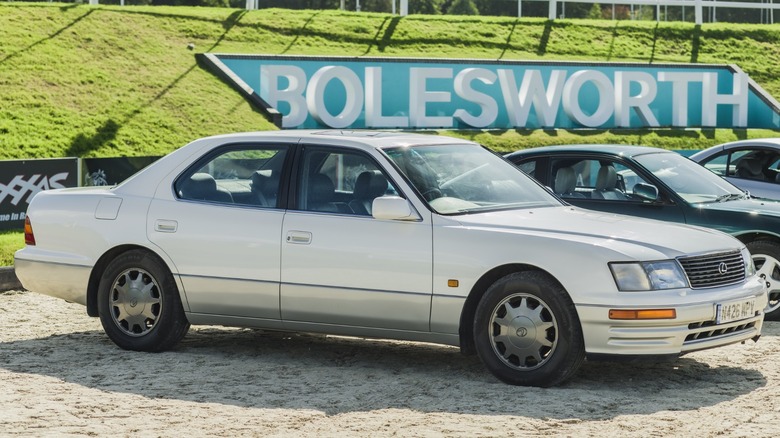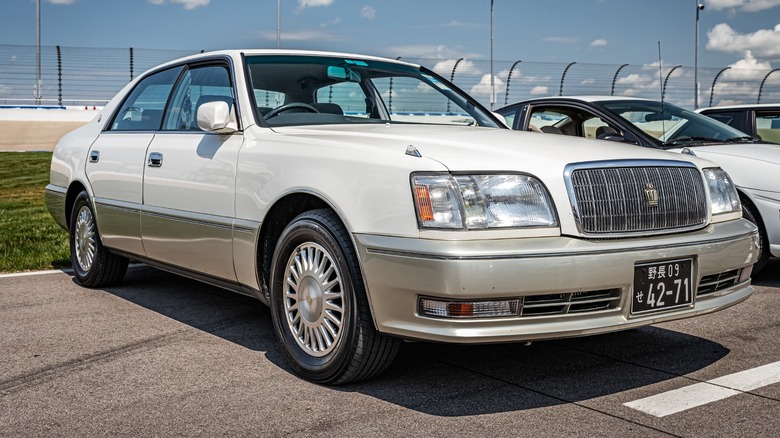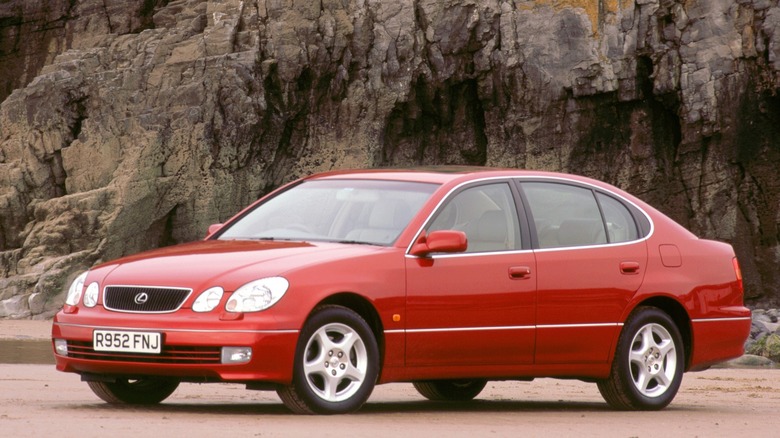Many car enthusiasts are familiar with the legendary 2JZ engine. This engine powered the equally mythical Toyota Supra A90 and several other Toyota models. However, it’s not the only engine Toyota made that delivers a lot of power.
That’s because the company also made a 32-valve V8 engine designed for strength and reliability — the UZ engine family. Although this engine has other variants, the first one was the 1UZFE, a 4.0-liter all-alloy design and one of the most reliable Lexus engines ever built.
Toyota designed the 1UZFE for use in luxury cars, so it needed a smooth-running engine that would not cause problems and damage the reputation of Toyota’s luxury marque. That’s why the 1UZFE used four camshafts, is all belt-driven, and has six-bolt main bearings.
The 1UZFE engine first appeared in 1989 in Lexus’ first vehicle, the Lexus LS 400. Since then, it has been available on other Lexus models and even on a couple of other Toyota cars. So, let’s check out every Toyota model that uses the 1UZFE to drive its wheels.
[Featured image by Morio via Wikimedia Commons | Cropped and scaled | CC BY-SA 3.0]
Lexus LS 400

Joe Morris/Getty
The LS 400 was the first model in the Lexus lineup. Since Toyota made this car to challenge established luxury brands like BMW and Mercedes-Benz, it knew it had to make a vehicle that would rival them in terms of comfort, price, and reliability. Lexus was successful in this regard, as the LS 400 is often considered one of the most reliable Lexus models ever built.
The 1UZFE proved so reliable that Lexus kept it for the Lexus LS until 2000, encompassing two generations — the 1989 to 1994 LS 400 (XF10) and the 1994 to 2000 LS 400 (XF20). Car owners have also proven the reliability of the 1UZFE with the LS 400. Automotive journalist Matt Farrah (via Road & Track) famously bought a used 1996 Lexus 400 with 897,000 miles on the clock. He then drove it to a million miles in 2019 with only minor maintenance and a few repairs.
Toyota Crown Majesta

Different_brian/Getty
Although the 1UZFE was made for the Lexus LS 400, Toyota also used it for the Toyota Crown Majesta — its flagship sedan in its home market of Japan after the Toyota Century. From its introduction in 1991 until the release of the fourth generation in 2004, the Toyota Crown Majesta had the 1UZFE engine as its most powerful motor.
Although the Toyota Crown Majesta did not make it to the United States, it was the Japanese equivalent of the LS 400 until the Lexus brand launched there in 2005 — one of the lesser-known facts about Lexus. Nevertheless, the Toyota Crown finally returned to the States for the 2024 model year, but no longer has the 1UZFE. Instead, it uses an inline-4 gasoline-hybrid engine.
The 1UZFE’s smoothness and reliability made it the top choice for Toyota’s premium V8-powered sedans, except for the Toyota Century, which used its own engine design. Some tuners even used the 1UZ in a Toyota Crown built for drifting — a testament to the performance and reliability of the engine design.
Lexus SC 400
In 1991, Lexus launched the SC 400. This car was the first sports coupe Lexus launched, and it still featured the 1UZFE as its top engine. Although Lexus introduced the SC 300 in 1992, powered by a 2JZ engine, its top-of-the-line model still had the V8 1UZFE powertrain. This lasted until 2000, when Lexus released the second-generation Lexus SC 430. Although it still used a UZ-family engine, it upgraded its 4.0-liter 1UZ-FE for a 4.3-liter 3UZ-FE mill.
Lexus’ tagline, Relentless Pursuit, inspired the SC 400. And, true enough, the Lexus team came up with another successful model. The SC 400 is often considered an underrated model, with many car enthusiasts opting for the more popular Toyota Supra. However, the Lexus SC is closely related to this model, with the lower 300 variant sporting the same engine.
So, if you want the performance and power of the 1994 Supra without paying a premium, pick the Lexus SC 300. But if you want a reliable V8 engine to go with your purchase, choose the 1UZFE-powered Lexus SC 400 instead.
[Featured image by Elise240SX via Wikimedia Commons | Cropped and scaled | CC BY-SA 4.0]
Toyota HiAce Ambulance

Nuttapong/Getty
The Toyota HiAce van is one of the longest-running nameplates in the world, having been launched in 1967. While the HiAce never made it to the US, it’s still a popular model available in over 150 countries globally. Because of its popularity and versatility, the HiAce van has been transformed into many vehicles — people use it for hauling around large families, businesses use it for transporting cargo, hotels use it as a jumbo taxi, and even hospitals use it as ambulances.
When Toyota created the 1UZFE, it saw the smoothness and reliability of this engine. That’s why, in 1992, it decided to use this engine, initially found in the Toyota Celsior (the Japanese version of the LS 400), for the Toyota Himedic — an ambulance built on the HiAce body. With the 1UZFE equipped on the purpose-built ambulance, operators were guaranteed that their ambulances could withstand the rigors of emergency driving and run as required when needed.
Lexus GS 400

Heritage Images/Getty
Lexus launched the GS luxury sport sedan in 1993. This model was designed to go toe-to-toe with the iconic BMW 5-series and Mercedes-Benz E-Class, so this model featured a more European flair. However, it was only available with a 2JZ-GE engine for its first iteration. It wasn’t until the 1997 to 2000 release of the second-generation GS that it received the 1UZFE engine found in its bigger brother, the Lexus LS 400.
Aside from the one-off Toyota Himedic, the Lexus GS 400 is the shortest run of the 1UZFE, having only been used for three years on the model. That’s because, by 2001, Lexus dropped the GS 400 and introduced the GS 430, which used the 4.3-liter 3UZFE. The 1UZFE was effectively replaced across almost all Toyota vehicles by 2001 by the slightly larger 3UZFE. Although the 3UZFE still used the same mechanicals as the 1UZFE, it had a larger displacement and more modern electronics.